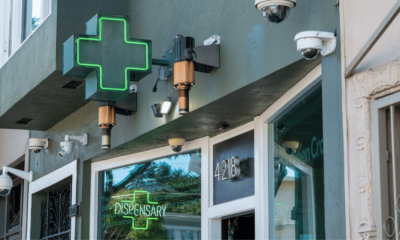Specialist nurse at Integro Clinics, Sophie Hayes talks to Cannabis Health about leaving the NHS after the pandemic and the important role nurses have to play in treating medical cannabis patients.
As COVID-19 ravaged the UK, Sophie Hayes was one of those fighting the virus on the frontline.
“This is not just a flu. It kills people and kills people quickly. I’m not sure everyone always realises that,” says the 29-year-old, who worked in the ICU at Kings College Hospital in London.
“It has been a complete privilege to work with people who you are in awe of every day, but we’re not soldiers. It’s just your job, we didn’t sign up to put our lives at risk in that way.”
Sophie qualified as a nurse in 2017 and spent her first years in the fast-paced environment of A&E before moving an acute medical unit and eventually to intensive care.
“For me A&E was a place where people came when they were living life too much. When I moved to intensive care, it felt like a more tragic environment. It was a place that was always a last resort, but then at the same time, miraculous things would happen,” she says.
“It’s been a huge privilege to be at the very worst and best moments of people’s lives.”
 However, after years of being a passionate advocate for medical cannabis in her personal life, the coronavirus pandemic was the catalyst for her finally making the move into the sector professionally.
However, after years of being a passionate advocate for medical cannabis in her personal life, the coronavirus pandemic was the catalyst for her finally making the move into the sector professionally.
When an opportunity came up this summer to join a new medical cannabis clinic, as the first practicing specialist nurse in the field Sophie says it felt like ‘fate’.
“It was a chance for me to utilise my professional skills, my passion for patients and my knowledge, excitement and energy for the potential of cannabis at a time where I felt like I couldn’t work for the NHS anymore,” she explains.
“Everyone knows nurses and clinicians are overworked but it became clear to me that the Government who were in charge of my life didn’t care about me or any of my colleagues – that was the overall feeling – and for me that was not something I was willing to accept anymore.”
Now Sophie is lead specialist nurse at Integro Clinics, a newly launched treatment centre for patients who have reached the limit of conventional medicines.
She is the first point of contact for patients to go through their symptoms and background, before following up with them to help develop a care plan that will work with their lifestyle.
She is then just a phone call away to answer any questions or concerns they have throughout their treatment.
As Sophie admits, it’s not a groundbreaking model in itself – it’s one commonly seen in the NHS – but she is the first in this role for medical cannabis patients.
“I’m not the first nurse to work within the field but I am the first that I know of, working in the capacity of a nurse,” she says.
“With the knowledge and experience that I had, it was exciting to be involved in the project from conception and to be able to have influence from the beginning in what the priorities should be.”
Sophie continues: “One of the key things that I felt was important at Integro was collaborative working. Working in the NHS you understand that it takes a whole team of specialists in order to take care of one person well.
“At Integro we have implemented regular meetings where patient cases are discussed, we are working with as many dispensaries as we can, and our clinicians are all part of the Medical Cannabis Clinicians society and Cannabis Patient Advocacy and Support Services (CPASS), organisations that support those working within this field, whileliaising with researchers, doctors, scientists and nurses from all over the world.”
Sophie’s championing of medical cannabis began around a decade ago, when her partner was diagnosed with Crohn’s Disease and found his cannabis use was helping to relieve some of the symptoms.
“When you’re training to be a nurse and all you want to do is help people, to not be able to help one of the people that you care about the most is an incredibly helpless situation,” she says.
“It took a long time for him to be diagnosed properly, we didn’t know what it was but we knew that he was in pain, vomiting and unable to sleep and we found that cannabis helped relieve some of those symptoms.”
She started researching and found there was evidence to suggest that cannabis could help a whole range of conditions. In 2014, her partner launched a patient advocacy organisation, the United Patients Alliance and Sophie joined him and other volunteers in travelling the country educating others about how cannabis had helped them.
“It was really important to them and it was important for the people who cared about them, to let others know that they didn’t need to continue to suffer needlessly,” says Sophie.
“We wanted to communicate to the Government that this was a legitimate thing that was accepted in other countries, so the fact that it wasn’t available to alleviate suffering here was not acceptable.”
In 2018 the law changed and Sophie went onto help establish the Nurse’s Arm of CPASS.
It’s goal was to raise awareness and educate nurses on the role they could play in medical cannabis healthcare.
“Nurses are integral to the running of the healthcare system, so it was astounding to me that we were in an environment where private clinics were being set up in a brand new field of medicine, where patients were finding medicines that work for them through trial and error essentially and there was no nursing support for those patients,” she says.

Sophie and her colleagues from CPASS are producing a nurse’s guide to provide a practical framework for others in the profession, as well as running education courses to encourage more nurses into the field, whether that is as clinicians, as part of research and clinical trials or even as advisors on projects.
She believes nurses have a vital role to play in treating medical cannabis patients but are as yet an ‘underutilised resource’.
“Everyone knows they are underappreciated in the NHS and now there is a whole new field where they just aren’t being utilised, when that profession has so much to give,” she says.
“Nurses can make amazing things happen for patients. A doctor can make a beautiful care plan, that makes all logical sense, but if it doesn’t fit with the patient’s day to day life it’s not going to work.”
With her professional experience and personal knowledge, Sophie is perfectly placed to be at the forefront of the drive to bring more nurses into the sector.
“I think people will respond really well to having a nurse’s input, especially a nurse who has lived with someone who is chronically unwell and has an understanding of the combination of professional and personal,” she says.
“I hope that those things mean I can help as many people as possible in this environment.”
While that environment may be very different from the A&E and ICU department at Kings College Hospital – where she still does one shift a month – it is equally as rewarding, she says.
“I could never fully let go of the NHS, it will always be in my heart, but this is a fantastic field to work in because we’re right at the beginning of an entirely groundbreaking area of medicine.”
She adds: “These medicines have been placed in the category of last-resort treatment, so we see people who continue to be in pain, regardless of having tried everything else.
“You get to help those people when it feels like there’s nothing else – suddenly there is another option.”

 News6 months ago
News6 months ago
 Science5 months ago
Science5 months ago
 Industry6 months ago
Industry6 months ago
 News6 months ago
News6 months ago
 News5 months ago
News5 months ago
 Health4 months ago
Health4 months ago
 News5 months ago
News5 months ago
 Health3 months ago
Health3 months ago
 However, after years of being a passionate advocate for medical cannabis in her personal life, the coronavirus pandemic was the catalyst for her finally making the move into the sector professionally.
However, after years of being a passionate advocate for medical cannabis in her personal life, the coronavirus pandemic was the catalyst for her finally making the move into the sector professionally.












